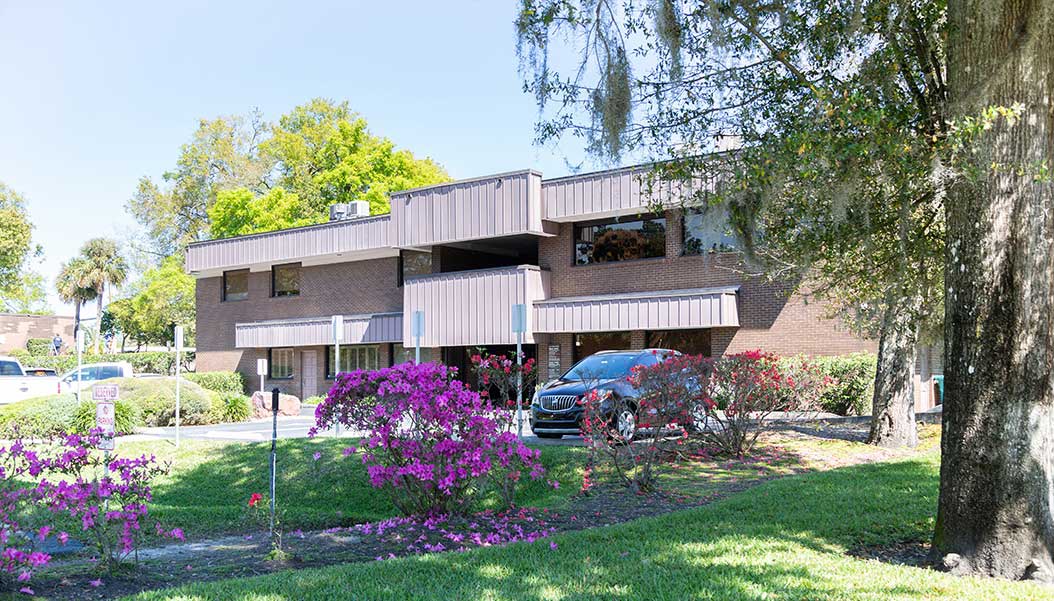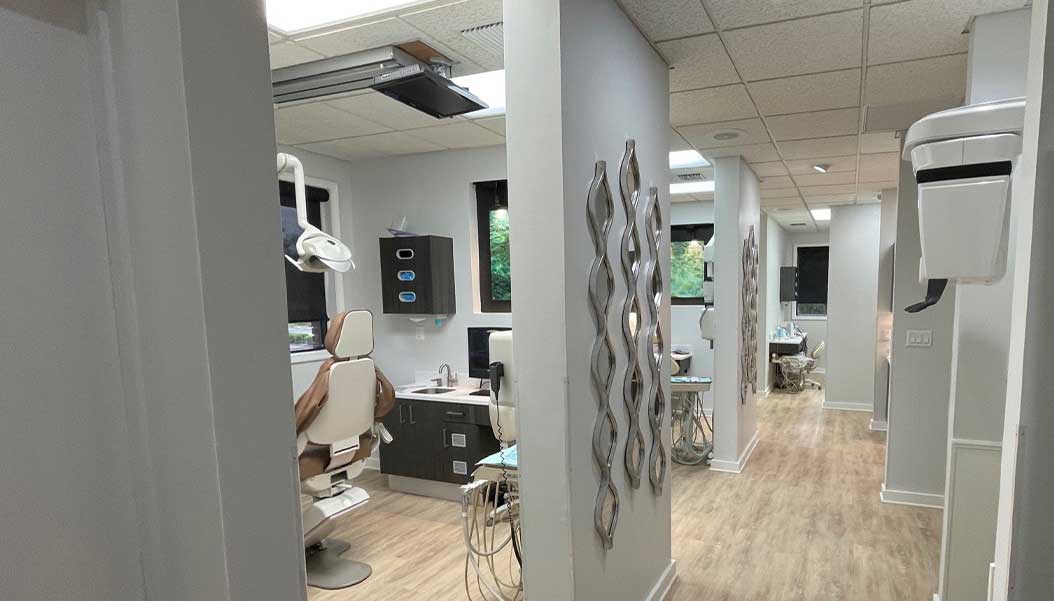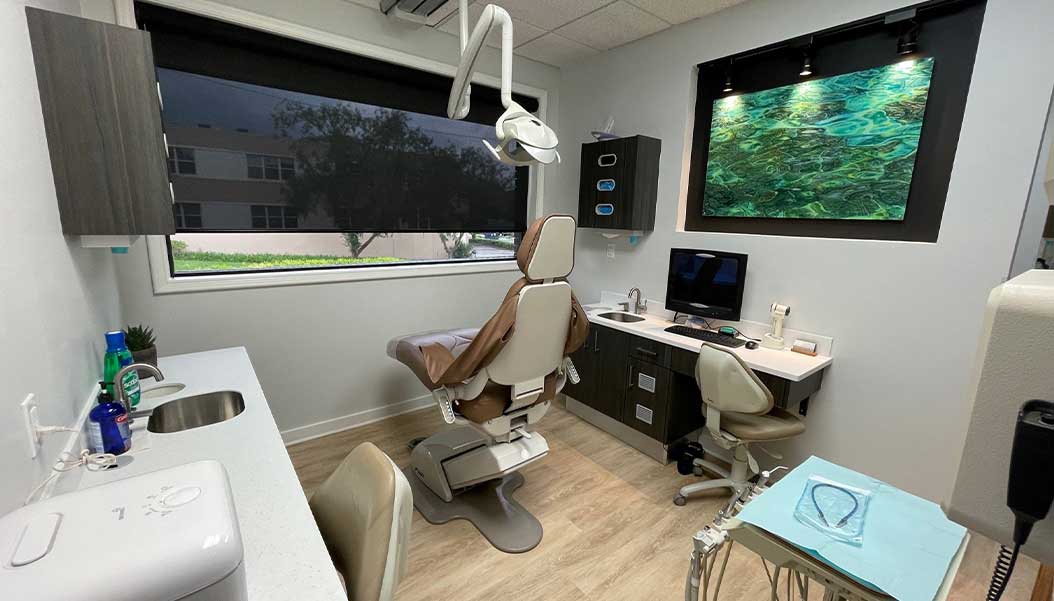Enjoy Lifelike, Lifelong Replacement Teeth
Dental implants have been around for a while, but over the last few decades, this procedure has been nearly perfected and boasts an impressive 98 percent success rate. It’s a commonly recommended treatment that can be used to replace one tooth or an entire arch with a lifelike alternative to traditional restorations like bridges and dentures. To learn more about this breakthrough in restorative dental treatments and whether you’re a good candidate for dental implants in Orlando, schedule a consultation with Dr. Russo today.
WHY CHOOSE JOHN E. RUSSO, DMD FOR DENTAL IMPLANTS?

Entire Dental Implant Treatment Performed In-Office

Computer-Guided Surgical Placement for Safe, Precise Results

Skilled Dentist with 25+ Years of Experience
What Are Dental Implants?
Dental implants are the only truly comprehensive solution to tooth loss. No matter how many teeth are missing, a dental implant gives you back the entire tooth structure – from the supportive root hidden beneath the gums to the visible crown.
Dental implants offer a better tooth replacement than any other method currently available. They are surgically placed and, over the course of four to six months, promote the growth of bone tissue to gradually bond together with your jawbone. Once this process – known as osseointegration – is complete, the dental implants provide a sturdy foundation for the crown, bridge, or denture that is affixed on top.


The Dental Implant Process
When you visit Dr. Russo for dental implants, the process will take place over the course of two phases. During the first phase, our team will examine your mouth to determine whether you’re a good candidate for dental implants and draw up a treatment plan and timeline for you so that you know what to expect. Our team is able to complete the entire process in-office, so you won’t have to worry about traveling between separate specialists. The next phase of the process will be restoring your mouth by attaching your bridge, crown, or denture to your implant.

Dental Implants: Phase 1
The first phase of the dental implant treatment is the preparation and placement of each implant post. This part usually takes place over the course of a month or so.
The steps involved in Phase 1 of dental implants include:
- Consultation – During this initial appointment, you and Dr. Russo will discuss your treatment plan and what you can expect with dental implants (including how much they will cost, recovery, etc.).
- Exam – During an examination, Dr. Russo will put together your treatment plan. By thoroughly examining your gums, surrounding natural teeth, and your unique facial features/structure, your dentist can achieve a tooth replacement that looks, fits, and feels just like it should.
- Procedure – Using advanced technology (more on that below) and according to the treatment plan already set in place, your dentist will carefully place the dental implant posts beneath the gum line.
- Recovery – Over the course of several months, the dental implant posts will encourage the growth of bone tissue and gradually fuse together with the jawbone. Once this process of osseointegration is complete, Phase 2 can begin.

Dental Implants: Phase 2
The second part of the dental implant procedure is the most exciting for the patient because this is when the prosthetic tooth/teeth are placed — and the smile is finally restored!
The steps involved in this phase include:
- Abutment – Traditional dental implants will require the placement of an abutment or the piece that connects the implant post to the prosthetic tooth/teeth. The implants will be exposed once more, and the second piece attached. Another brief healing period is required after this minor surgery.
- Restoration – After one to two weeks, the prosthetic tooth/teeth are attached to the implant posts.
- Follow-up – Your dentist will recommend a follow-up after a few more weeks or so to confirm that everything is just right with your new dental implants!

CareStream 8100 3D
Patients undergoing the first phase of the dental implant treatment at our office benefit from the CareStream 8100 3D — an advanced guided implant placement system that increases precision and accuracy for greater dental implant success! This tool allows your dentist to look at a high-resolution image of your jaw as the implants are being placed, to ensure they are implanted exactly where they should be for maximum security and longevity.
Computer-Guided Dental Implant Placement
A guided dental implant procedure will have maximum success, as this method limits the position, angulation, and depth of the drill to ensure that the dental implants are placed precisely where they need to go. Non-guided implant placement is still a viable option for many dentists and their patients, but by offering the latest technology, we can vastly improve both the safety and accuracy of dental implant placement — a number that was already high, to begin with!

What Is Computer-Guided Dental Implant Placement?
Computer-guided implant placement helps Dr. Russo to provide more accurate and precise dental implant placement procedures. The Carestream 8100 provides a crystal-clear 3D image of your oral anatomy that is ready within seconds and allows for the viewing of special interest areas from every angle with one-to-one accuracy.
Treatment planning is far more successful with this state-of-the-art technology. Having such a detailed look at the jaw facilitates diagnosing the need for bone grafting before implant placement. And, with the image provided by the Carestream 8100, Dr. Russo can then create a digital guide for placing your dental implants to set you up with a properly functioning tooth replacement that provides maximum longevity.
Here is how it works, in a little more detail:
- First, the 3D scans are captured in-office. The patient stands comfortably as the scanner rotates fully around the head. The captured information is then made available for Dr. Russo to view on a screen shortly after.
- A detailed, 3D model is ready for use. The implants can be placed virtually first, sort of like a test run to ensure optimal length, width, and positioning for maximum success and precision.
- The digital model is converted into a surgical guide to be used for the actual implant placement.

Who Is Computer-Guided Dental Implant Placement Good For?
Not everyone undergoing dental implant treatment will need to have a computer-guided procedure. This technology is often reserved for patients who have more complex needs, like those with significant tissue depletion or those undergoing a full mouth reconstruction. Conventional procedures are often possible without computer-guided placement. Dr. Russo will discuss the technology required for your implant procedure during a consultation.


Benefits of Dental Implants
Because they offer a comprehensive solution to tooth loss, dental implants offer a wealth of benefits for patients who are missing teeth. Some of the most significant advantages of this tooth replacement method include:

- Improve the Function of Your Teeth – For patients missing a larger number of teeth, an implant-supported partial or full denture may be recommended. Traditional, removable dentures only restore between 5% and 20% of healthy chewing function. Implant-supported dentures restore about 70% of chewing function. This means that patients can chew a wider range of foods and maintain a more nutritious diet.
- Natural Look, Feel & Function – Once in place, your implant-supported tooth or teeth will look, feel, and function just like your natural smile. Because the implant posts mimic the root structures of lost teeth, your newly restored smile will look and feel just like your healthy, natural dental structures.
- Easy Oral Hygiene – Because implant-supported restorations are fixed, you can easily brush them just like your natural teeth. Be sure to brush at least two minutes at a time twice a day. To keep your implant-supported replacement teeth looking and feeling great for years to come, consider brushing between meals as well as in the morning and before bed. You may also need to change to a specialized flossing tool if you have a larger partial or full denture. This will allow you to remove plaque and bacteria that can accumulate between the denture base and the gum tissue. We may also recommend you receive more frequent dental checkups and professional teeth cleanings for the first few years following dental implant tooth replacement. This is especially important for patients who have struggled with gum disease.

Health Benefits
- Existing Teeth Remain Untouched – Dental implants do not require the altering of healthy teeth. Instead, they simply fit within the vacated socket and serve as foundational structures for your new restoration. This is vastly different than a fixed bridge that uses healthy abutment teeth as anchors.
- Maintain a Healthy, Youthful Facial Structure – Dental implants do not require the altering of healthy teeth. Instead, they simply fit within the vacated socket and serve as foundational structures for your new restoration. This is vastly different than a fixed bridge that uses healthy abutment teeth as anchors.
- Prevent Bone Loss – The loss of even a single tooth will cause diminished jawbone density over time, which will lead to further tooth loss. By replacing the lost tooth roots, dental implant restorations offer the stimulation necessary to prevent the loss of bone density.

Long-Term Benefits
- High-Success Rate of Placement – Maintaining a 95% success rate upon initial placement by an implant dentist, these prosthetics offer optimal stability and durability for patients suffering from tooth loss.
- Keep Your Smile for Life – Traditional crowns, bridges, and dentures need to be replaced every five to ten years to ensure optimal function. Implant-supported teeth can last two decades or longer, and with proper care, many patients keep their restored smiles healthy for a lifetime.
- Keep More Money in Your Pocket – While the upfront cost is high, dental implants are a cost-effective solution. Because you will not need to buy denture adhesives or see your dentist for regular adjustments or replacements, you will actually save money in the long run.
Who Dental Implants Can Help
There are a few methods of dental implant placement available, and the one that is right for you will depend on the particulars of your oral health needs. The good news is dental implants can be used to replace single, multiple, and even all teeth in a given arch with ease. Keep reading to learn how we make it happen!
Missing One Tooth
A single missing tooth can be replaced with one implant post that is surgically positioned below the gumline. A small incision is made into the gums. Then, an implant post is positioned into the jaw. Over the course of three to six months, the implant fuses with the jawbone. Once the implant is firmly in place, we’ll design and craft a dental crown to replace the missing tooth. Unlike traditional single-tooth replacement that relies on healthy surrounding teeth for support, implant-supported dental crowns are completely self-supporting, and they look and function just like healthy teeth.
Missing Multiple Teeth
For patients missing two or more consecutive teeth, a fixed bridge can be attached to two implant posts, one at each end, to repair healthy, natural function. Patients missing numerous consecutive and nonconsecutive teeth may need an implant-supported partial denture. These tooth replacement prosthetics use a gum-colored base material to fit between remaining healthy teeth, recreating a full, healthy smile. Partial dentures can usually be supported with two to four implant posts.
Missing All Teeth
When you’ve lost a full row of teeth, we can use four to six implant posts to support a denture. Like other implant-supported tooth replacement options, you’ll need to wait for several months to allow the implant posts to fuse with the jawbone. However, in order to allow you some smile function, we will usually provide a temporary denture until the implant posts have fully fused with the gum line. Once your implants have fused with the gum and bone structure, we’ll attach the gum-colored denture base to the implant posts, restoring the natural form and function of your smile.
All-on-4
You can replace an entire arch of missing teeth in just one day while enjoying the security of dental implants. All-On-4 is a convenient and effective solution to treat complete tooth loss. As few as four titanium implant posts are strategically placed into your jaw to anchor your denture. This eliminates any slipping or irritation to give you the next best thing to your real teeth.


Understanding the Cost of Dental Implants
It is difficult to estimate what your dental implants will cost without a consultation from your implant dentist. There are a number of factors that can affect how much you should budget for dental implants, including the following:
- The health of your jawbone. If a bone graft or sinus lift is needed to increase the volume before implant placement, the price will increase.
- How many dental implants are required, since each post is individually placed?
- Special considerations like additional anesthesia or sedation.
- Where in the jaw the dental implants will be placed.
During an initial consultation, we can give you a good idea of what you can expect to pay for dental implants based on these factors.

Factors Influencing Dental Implant Cost
During a dental implant consultation, your dentist will consider several factors to give you an estimate of what you can expect to pay for dental implants. Some of the most considerable things that can increase the price of a dental implant procedure include:
- How healthy your jawbone is – A bone graft or sinus lift performed before dental implant placement will increase the price of the procedure. This type of procedure may be necessary for people who have been missing teeth for a while or who have had severe periodontal disease.
- Where in the jaw the implants will be placed – It is usually more complex and costly to place dental implants in the front of the jaw due to cosmetic concerns.
- What the implants are made of – When an alternative to titanium is required due to metal allergies or sensitivities, the price of an implant procedure increases.
- How many dental implants you need – Each post is individually priced, which means it is often more costly to get several implants than just one.

Does Dental Insurance Cover Dental Implants?
Unfortunately, usually not. Dental insurance often requires patients to choose the least expensive treatment option for tooth replacement, which may mean a conventional denture or fixed bridge. This is why we always encourage patients to make decisions based on what is best for their oral health rather than strictly on what is covered by dental insurance. However, some parts of the procedure may be covered — like the dental crown. Talk to your dental insurance provider to find out just what you are eligible for with your plan.

What About Financing?
Patients who could use help paying for dental implants may benefit from third-party financing, which allows big bills to be split up into convenient payments. You can discuss this option with our team during a consultation. CareCredit and CitiHealth are two options that we are pleased to work with.
Advanced Dental Implant Procedures
Dental implants have a long-term success rate of over 95%, and part of that success relies on having a healthy jawbone to provide implants with the strength and support they need. Since the jaw becomes thinner and weaker over time when the teeth are lost (or maybe naturally thinner in certain areas), Dr. Russo may recommend preliminary treatment such as a bone graft or sinus lift to prepare the jaw for a dental implant procedure. Learn more about these advanced treatments and how they’re used to lay the foundation for long-term dental implant success.

Bone Grafting
A bone graft can be a great option for people whose jawbone is thin or weak as a result of gum disease (which destroys the bone over time) or who lost their teeth a long time ago and have experienced the natural bone loss that occurs when the teeth are lost.
The procedure typically takes between 45 and 90 minutes and involves placing bone grafting material or bone tissue from another area of your body into the area of the jaw where the implant will be. This encourages your body to rebuild more of its own bone so that it can provide the solid, stable foundation dental implants need.
While the initial recovery period is around seven to ten days, it often takes between three and six months for the jaw to build enough bone for the implant procedure to be done. However, in some cases, the bone graft and implant procedure can be done at the same time.

Sinus Lift
A sinus lift is only done when dental implants will be placed in the upper jaw, which is naturally thinner, has less bone density, and is also very close to the sinuses. To give the upper jaw enough “height” to support the length of an implant post, a sinus lift raises your sinuses and adds additional bone tissue into the area. Similar to a bone graft, this procedure also encourages the body’s own bone growth, so it will take some time (generally between three and nine months) before you’re ready to have implants placed in your jaw.
While these preliminary treatments add time to your treatment plan, they also enable you to enjoy a healthy, restored smile for a lifetime, so the payoff is well worth it!


Maintaining & Caring for Your Dental Implants
What do you need to do to perform proper dental implant care in Orlando? The answer is almost nothing you wouldn’t already do for regular dental care! Dental implants don’t require any trick to clean them or any maintenance that requires specialized products; you can keep your new teeth safe by continuing to take the same proactive approach that you employ to protect your natural teeth. Below are some basic tips you can follow to help your implants last. If you want to know if there’s anything more you can do, contact our office.

Make Oral Hygiene a Priority
An implant can’t get cavities, but the tissues anchoring it in place can still be damaged or destroyed by gum disease. Keeping your gums healthy will help prevent oral health issues that could ultimately lead to implant failure. Simply brush and floss at least two times every day to keep your implants and the area around them clean of food and harmful bacteria. Be thorough with your brushing; each session should last at least two minutes, and you should pay close attention to the space between the implant restorations and the gums.

Eat a Healthy Diet
Having an occasional sweet treat will not put your dental implants at risk. Consuming too much sugar and starch, however, can easily lead to gum disease, which in turn will cause serious issues for your implants. Make sure that you’re eating candy, chips, and sweets in moderation in order to keep all of your teeth as safe as possible. Fruits, vegetables, dairy products, and lean proteins tend to improve your oral health; in particular, foods that contain calcium and vitamin C will directly contribute to an environment that’s ideal for implants.

Break Bad Habits
As strong as dental implants are, they can still be broken or worn down. Avoid using your implants to bite your nails or chew on pen tips, and stay away from extremely hard foods (such as ice and hard candy) that could cause damage if you bite down on them. Do not tear open packages with your teeth; find an actual tool to do the job. If you’re a smoker, quit as soon as you can to keep your risk of developing gum disease to a minimum.

Protect Your Dental Implants
Do you have a tendency to grind your teeth when stressed? You can consciously avoid doing so during the day, but at night you’ll need to wear a personalized nightguard. This will protect your dental implants (and your natural teeth) from the damage that frequent grinding can cause. You should also get a mouthguard to wear while participating in any athletic activity as a safety precaution.

Schedule Regular Dental Checkups
During your routine checkups, we will examine your implants along with your natural teeth. This allows us to confirm that no problems are developing. If any potential issues are found, we’ll inform you immediately and let you know what steps you can take to avoid a bigger problem later on.
Dental Implant FAQs
With decades of experience as a dentist in Orlando, Dr. Russo has seen the benefits of dental implants firsthand: dramatically better chewing strength, a more natural look and feel, and the potential to last a lifetime are just some of them! But it’s still completely understandable to have a few questions about the procedure before making a final decision. Below, you’ll find answers to several common FAQs to help you have the information you need. And, as always, you can give us a call anytime with any other questions you may have.

Does getting dental implants hurt?
Dr. Russo will begin by making sure the area is completely numb, so while you will feel pressure, you won’t feel any pain. Also, keep in mind that we make your comfort a top priority during every visit and also have sedation options available for fearful or anxious patients. Finally, you’ll be glad to know that one of the comments we often hear after implant surgery is, “That was a lot easier than I thought it would be!”
Will my dental implant fail?
One of the biggest advantages of dental implants is that they have a 95% success rate (in non-smokers) and can last a lifetime. In the fairly rare case of failure, however, it often occurs for one of these reasons:
- Peri-implantitis – This is a particular type of gum disease that destroys the gums and underlying bones that support an implant. If it’s caught in time, professional care and good oral hygiene at home can usually treat it and prevent implant failure.
- Clenching and grinding – Clenching and grinding puts a lot of force on both natural teeth and implants. Wearing a nightguard will protect an implant from becoming loose.
- Infection and poor oral hygiene – Developing an infection in the tissues around an implant doesn’t happen very often, but it’s more likely when someone isn’t keeping their implant clean or getting routine dental checkups.
- Smoking – Smoking lowers the success rate of implants to around 85%.
Am I a good candidate for dental implants?
With advanced methods and techniques, the vast majority of patients can successfully get dental implants in Orlando. With that said, everyone is unique, and Dr. Russo will evaluate a number of factors before making the best recommendation for you. One of those factors will be the mass and density of your jawbone. If it’s been a long time since you lost your teeth and you’ve experienced bone loss, we may recommend a bone graft to strengthen your jaw before placing your implants.
What happens if I don’t replace my missing tooth?
It may be tempting to leave an empty space after losing a tooth, but it’s important to be aware that you can run into oral health problems down the road such as:
- It may become more difficult to eat certain foods or speak clearly.
- Your remaining teeth will begin to move and shift. This leads to bite alignment issues, uneven wear, potential TMJ problems, and possibly even more tooth loss.
- Having a gap in your smile can make you feel self-conscious or embarrassed in social situations.
- After tooth loss, the jawbone that once surrounded the root begins to deteriorate, leaving your jaw thinner and weaker over time. In addition to changing the shape and structure of your face, it could mean that you need additional procedures such as a bone graft or sinus lift if you decide to get a dental implant in the future.

Dental Implant Post-Op Instructions
Having the necessary dental implant post-op instructions in Orlando is essential if you want your new smile to last a lifetime. Dr. Russo and our team of expert professionals will ensure you have all the important information, so you can enjoy a swift and successful recovery at home. Because it does take several months to fully heal from your oral surgery, you’ll need to make sure you’re following the specific guidelines to avoid any potential complications along the way. If at any point during your recovery you feel as if something is wrong or you are experiencing unnatural pain, contact our office right away.

What to Do Directly After Dental Implant Surgery
It is best to have someone escort you home after having your dental implants surgically placed. Because it takes time for the anesthesia to wear off, you’ll want to make sure you get plenty of rest. Also, you’ll need to avoid touching or chewing on the implant sites. It is natural to experience some soreness, but you’ll need to make sure you:
- Do not smoke or use tobacco products for at least one full day. It is far better to stop this habit long before you receive dental implants in Orlando, but if you’ve yet to kick the habit, wait at least 24 hours before resuming.
- Do not sip through a straw.
- Do not spit or swish vigorously.

Common Side Effects
No matter the type of oral surgery, it is natural to feel some soreness and discomfort afterward. As your anesthesia wears off, it’s important you understand what is normal and what is not, such as:
- Minor swelling is normal for up to one week. A cold compress can help to alleviate inflammation and discomfort the first day.
- On and off slight bleeding up to 2 days is normal and can be slowed/stopped using clean gauze with bite pressure over site for at least 20 minutes.
- Soreness is unavoidable but can be different for every patient. If medically able, taking an over-the-counter or prescribed anti-inflammatory and other pain relievers can really help.

Diet
You may be hungry after your dental implant surgery, but you’ll need to make sure you stick with soft foods initially. Applying too much pressure to your implant posts is not a good idea in the beginning. They need ample time to fuse with the bone. Instead of eating hard, crunchy foods, it’s best to stick with the following for a few days:
- Pasta
- Scrambled eggs
- Yogurt
- Ice cream
- Pudding
- Soup (warm)
- Mashed potatoes
- Protein drinks
You can begin to incorporate solid foods once your mouth feels more normal and less uncomfortable.

Health & Oral Hygiene
To avoid the potential of an infection or possible damage to your dental implants, you will need to make sure you’re maintaining good oral hygiene at home. It is fine to wait until the following day to brush your teeth, but you’ll want to avoid any mouthwash that contains alcohol. You can soak 2 times a day with a warm saltwater. This will help to encourage soft tissue healing and comfort.

What to Do After Your New Teeth Are Attached
Your implant dentist in Orlando will secure your customized restoration to your dental implants once you are fully healed. You should have no bleeding, swelling, or serious discomfort. Instead, you should be able to freely enjoy your new and improved smile!











